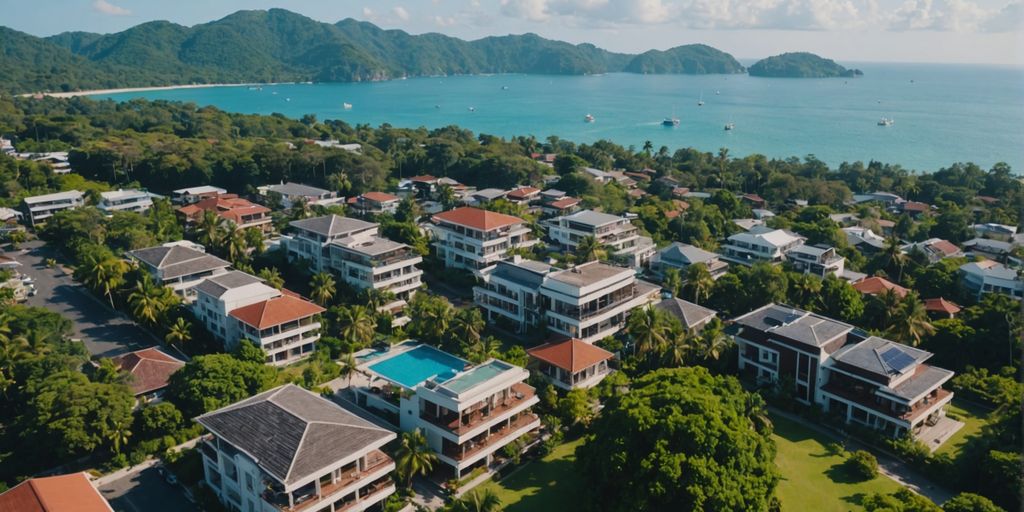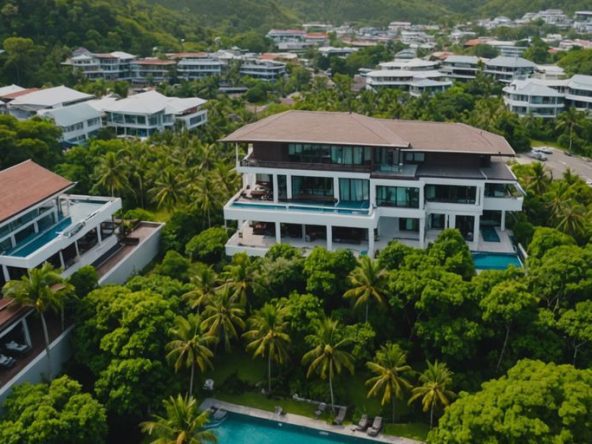Buying property in Phuket as a foreigner can be a rewarding investment, but it comes with its own set of challenges and legal considerations. While foreigners are generally not allowed to own land, there are specific types of properties they can legally purchase. This guide will walk you through the essential steps and considerations for buying property in Phuket, from understanding ownership laws to navigating the legal framework and financial aspects.
Key Takeaways
- Foreigners can legally buy certain types of properties in Phuket, such as condominiums, houses, and villas under specific ownership structures.
- Understanding the legal restrictions on land ownership is crucial, as foreigners are generally not allowed to own land in Thailand.
- Hiring a professional lawyer and working with a reputable real estate agent can help you navigate the complexities of Thai property law and bureaucratic requirements.
- Financial considerations include transferring money to Thailand, understanding taxes and fees, and exploring financing options.
- Phuket offers strong investment potential with opportunities for rental yields and capital appreciation, making it an attractive destination for foreign property buyers.
Understanding Foreign Ownership Laws in Phuket
Foreigners looking to buy property in Phuket must navigate a complex legal landscape. Thailand’s property market is not particularly open to non-citizens, and there are several region-specific restrictions to consider. Here are the key points to understand before making a purchase.
Types of Properties Foreigners Can Own
Foreigners can legally own units in a registered condominium, either as Foreign Freehold or Leasehold. For example, a luxurious 3-bedroom ocean view condo in Phuket’s sought-after Surin Beach can be owned freehold. However, foreigners are not allowed to own land directly.
Legal Restrictions on Land Ownership
Under Thai law, foreign nationals cannot own land in Phuket. This restriction means that while you can own a condo, owning a house or villa requires a leasehold arrangement. Additionally, foreigners can only own up to 49% of the total area of all units in a condominium project.
Leasehold vs Freehold
When it comes to property ownership, foreigners have two main options: leasehold and freehold. Leasehold ownership allows foreigners to lease land for up to 30 years, with the possibility of renewal. Freehold ownership, on the other hand, is only available for condominium units. It’s crucial to understand these distinctions to make an informed decision.
Navigating these laws can be challenging, but understanding them is essential for a smooth property purchase process in Phuket.
Navigating the Legal Framework
Hiring a Professional Lawyer
When it comes to real estate, having an experienced lawyer is quite crucial for a foreigner. A lawyer will effectively guide you in understanding how the Thai real estate laws work and greatly reduce your risks. Along with the contracts involved in purchasing a property, they can also help you with the due diligence process. They will run a title search for you to get confirmation that the person you are buying from is legit and owns the land or property.
Understanding Thai Property Law
Thailand’s laws do not permit any foreigner to own land, but they allow them to purchase properties. Keeping this in mind when you are considering buying a property is essential. Trying to go around the law might be disastrous. There are several conceivable infractions that fall under different provisions of the legislation, such as the Land Code, the Foreign Business Act, and the Civil and Commercial Code.
Dealing with Bureaucratic Requirements
Navigating the bureaucratic landscape in Thailand can be challenging. It is advisable to perform due diligence on the projects that you’ve been presented with and evaluate your sales representative. Seek the most effective legal representation and do not be hasty in your decisions. Understanding the bureaucratic requirements will help you avoid potential pitfalls and ensure a smoother transaction process.
Researching Thailand’s laws may help you confirm the lawyer you deal with is knowledgeable. Thailand’s laws do not permit any foreigner to own land, but they allow them to purchase properties. Keeping this in mind when you are considering buying a property.
Types of Properties Available for Foreigners

Foreigners looking to invest in Phuket have several property options available to them. Each option has its pros and cons, and those typically depend on what type of property is being bought. Here, we break down the types of properties that foreigners can own in Phuket.
Condominiums
Foreigners can buy condo units and have their names registered on the title deeds, also known as the Chanote. This is one of the most straightforward property types for foreigners to own in Thailand. Condominiums offer a range of amenities and are often located in prime areas, making them a popular choice for both living and investment purposes.
Houses and Villas
While foreigners are not allowed to own land in Thailand, they can own and control the building and structures located on a plot of land. This means that foreigners can buy houses and villas, but the land itself must be leased. For example, a 4 bed private beach villa can be an attractive option for those looking to enjoy a luxurious lifestyle in Phuket.
Apartments
Apartments are another viable option for foreign buyers. These properties are similar to condominiums but may not offer the same level of amenities. However, they can still provide a comfortable living space and are often more affordable. Apartments can be a good choice for those looking to invest in rental properties or for personal use.
Foreigners can buy or own property in Phuket through a variety of ownership structures, but there are some restrictions in place and certain processes have to be followed.
Financial Considerations for Foreign Buyers
Transferring Money to Thailand
When purchasing property in Phuket, one of the first financial considerations is transferring money to Thailand. Foreign buyers must adhere to Thai regulations, which require funds to be transferred in foreign currency and converted to Thai Baht by a local bank. Ensure all transactions are well-documented to avoid complications during the property registration process.
Taxes and Fees
Foreign buyers should be aware of the various taxes and fees associated with property ownership in Phuket. These include:
- Transfer Fee: Typically 2% of the property value.
- Stamp Duty: 0.5% of the property value, applicable if the transfer fee is not paid.
- Withholding Tax: 1% of the property value or the appraised value, whichever is higher.
- Specific Business Tax: 3.3% of the property value, applicable if the property is sold within five years of purchase.
It’s crucial to factor these costs into your budget to avoid any financial surprises.
Financing Options
While financing options for foreigners are limited in Thailand, some local banks offer mortgage loans to non-residents. These loans typically require a substantial down payment, often around 30-50% of the property’s value. Additionally, interest rates for foreign buyers may be higher compared to those for Thai nationals. Carefully evaluate your financing options and consider consulting with a financial advisor to determine the best course of action.
Proper financial planning and understanding the associated costs are essential for a smooth property purchase in Phuket. Always consult with professionals to navigate the complexities of property ownership as a foreigner.
The Role of Real Estate Agents
When buying property in Phuket, the role of a real estate agent cannot be overstated. A reputable agent can be your most valuable asset in navigating the complexities of the local real estate market. They offer insights into the best properties, handle negotiations, and ensure that all legal requirements are met.
Finding a Reputable Agent
Given that anyone can become a real estate agent in Thailand without any formal training or certification, it’s crucial to choose wisely. Look for agents with a proven track record and positive client testimonials. Personal recommendations can also be invaluable. For instance, a luxury real estate agency in Phuket offering 2-bedroom lake view townhome with private pool might be a good starting point.
Agent Fees and Commissions
Agents typically earn their fees once the principal deposit on a property is paid. It’s essential to understand the fee structure before engaging an agent. Fees can vary, but they usually range between 3% to 5% of the property’s purchase price. Always clarify this upfront to avoid any surprises later.
Benefits of Using an Agent
A professional agent will have done basic research and due diligence on the properties they are promoting. They can provide valuable insights and communicate any potential issues with the property. This helps you make an informed decision and avoid buyer’s remorse. Additionally, agents can assist with property inspections, negotiations, and even recommend reliable legal advisors to handle the paperwork and due diligence checks.
Engaging a knowledgeable real estate agent can save you time, money, and stress, making your property buying experience in Phuket much smoother and more enjoyable.
Steps to Buying Property in Phuket

Initial Research and Property Visits
Before making any commitments, it’s crucial to conduct thorough research on the types of properties available, such as Villas For Sale Thailand. Visiting properties in person allows you to get a real sense of the location, amenities, and overall environment. Utilize online resources and local real estate agents to gather as much information as possible.
Making an Offer
Once you’ve identified a property that meets your needs, the next step is to make an offer. This involves negotiating the price and terms with the seller. It’s advisable to have a professional lawyer review the offer to ensure all legal aspects are covered. Be prepared for some back-and-forth before reaching an agreement.
Closing the Deal
After the offer is accepted, the closing process begins. This includes signing the sale agreement, transferring funds, and registering the property with the local land office. Ensure all taxes and fees are paid, and that you have all necessary documentation. Hiring a property manager can be beneficial, especially if you plan to use the property for short term rentals.
The process of buying property in Phuket can be complex, but with the right preparation and professional assistance, it can be a rewarding investment.
Common Pitfalls and How to Avoid Them
Legal Risks
One of the most significant mistakes you can make when buying property in Phuket is not hiring a specialist real estate lawyer. While it isn’t legally required, it is strongly recommended. Without one, you may inadvertently encounter unnecessary complications and delays, or even fall foul of the law. Always ensure that the property has a clear and undisputed title. This can be verified through a thorough title search conducted by your lawyer.
Financial Risks
Financial risks are another major concern. Be cautious of developers’ reputations, their financial stability, and the land titles involved. It’s crucial to inspect the property yourself to identify any potential damage or flaws that may need immediate or future attention. Never put down any money unless you are completely satisfied with the developer and the project.
Market Risks
The real estate market in Phuket can be volatile. Short term rentals, for instance, can be highly profitable but also come with their own set of risks, such as fluctuating demand and regulatory changes. Do not rely solely on information from real estate brokers, developers, or attorneys. Conduct your own research to understand the market conditions better.
Taking your time and following all the advice above will substantially lessen the likelihood of anything going wrong. Always scrutinize your sales agent and avoid high-pressure sales tactics. If you feel rushed or stressed, consider switching agents.
Investment Potential in Phuket
Rental Yields
Phuket’s rental yields are comparable to the 5% returns found in other Thai cities. This makes it an attractive option for investors looking for steady income. The stunning 5 bedrooms lake view villa is a prime example of properties that can generate significant rental income. With the island’s thriving tourism industry, rental properties are in high demand, ensuring a consistent stream of tenants.
Capital Appreciation
Phuket has excellent appreciation potential, primarily driven by its robust tourism sector. The island has transitioned from its historical reliance on tin and rubber to becoming Thailand’s wealthiest province on a GDP per capita basis. This economic shift has significantly boosted property values, making real estate investment in Phuket a lucrative opportunity.
Tourism Impact
The tourism industry is the backbone of Phuket’s economy, contributing significantly to its growth and development. The influx of tourists creates a high demand for rental properties, which in turn drives up property values. Investing in Phuket real estate not only offers the potential for rental income but also the prospect of capital appreciation as the tourism sector continues to expand.
Investing in Phuket real estate offers a unique blend of steady rental income and potential for significant capital appreciation, driven by the island’s thriving tourism industry.
Living in Phuket as a Property Owner
Living in Phuket as a property owner offers a unique blend of tropical paradise and modern amenities. Phuket’s cost of living is relatively affordable compared to Western countries, making it an attractive destination for expatriates. The island provides a variety of housing options, from a studio stylish condo with golf court view in Laguna to a Luxury Villa In Thailand.
Cost of Living
Phuket’s cost of living is relatively affordable compared to Western countries, making it an attractive destination for expatriates. The island provides a variety of housing options, from a studio stylish condo with golf court view in Laguna to a Luxury Villa In Thailand.
Community and Lifestyle
Phuket boasts a vibrant expatriate community, offering a mix of local and international cultures. The island is known for its stunning beaches, bustling markets, and a wide range of dining options. Whether you prefer the tranquility of a secluded beach or the excitement of a lively nightlife scene, Phuket has something to offer everyone.
Healthcare and Education
Phuket is home to several high-quality healthcare facilities and international schools, making it a suitable place for families. The healthcare system is well-developed, with numerous hospitals and clinics providing excellent medical care. International schools offer a variety of curricula, ensuring that children receive a world-class education.
Living in Phuket as a property owner provides a unique blend of tropical paradise and modern amenities, making it an ideal destination for expatriates and families alike.
Property Management and Maintenance
Hiring a Property Manager
When owning property in Phuket, hiring a property manager can be a wise decision. A property manager can handle day-to-day operations, ensuring that your investment is well-maintained and tenants are satisfied. This is particularly beneficial for foreign owners who may not be residing in Thailand full-time. Property managers can also assist with finding tenants, collecting rent, and handling any maintenance issues that arise.
Maintenance Costs
Understanding the maintenance costs associated with your property is crucial. These costs can include routine upkeep, repairs, and any necessary renovations. For instance, if you own a villa near Layan Beach, you might need to budget for regular maintenance to keep the property in top condition. It’s also important to consider the costs of maintaining common areas if you own a condominium. Regular inspections can help identify potential issues early, saving you money in the long run.
Long-term vs Short-term Rentals
Deciding between long-term and short-term rentals can impact your property management strategy. Long-term rentals often provide a stable income and require less frequent tenant turnover. On the other hand, short-term rentals can offer higher rental yields but may require more intensive management. For example, a 4-bedroom villa near Layan Beach could be a lucrative short-term rental option, attracting tourists looking for a luxurious stay. However, this would necessitate more frequent cleaning and maintenance.
Effective property management is key to maximizing your investment’s potential and ensuring a hassle-free ownership experience.
Future Trends in Phuket’s Real Estate Market
Market Predictions
The Phuket Real Estate Market is poised for significant growth in the coming years. With the island’s increasing popularity among tourists and expatriates, demand for properties, especially Luxury Villas For Sale, is expected to rise. According to recent reports, the market is likely to see a steady increase in property values, driven by both local and international buyers.
Government Policies
Government initiatives aimed at boosting foreign investment are likely to have a positive impact on the real estate sector. Policies that simplify the process for foreigners to buy property, coupled with incentives for sustainable development, are expected to attract more investors. This is particularly relevant for those looking to invest in the Best Beach Villas and other high-end properties.
Sustainable Development
Sustainability is becoming a key focus in the Real Estate Phuket Thailand market. Developers are increasingly incorporating eco-friendly features into new projects, from energy-efficient buildings to sustainable landscaping. This trend is not only beneficial for the environment but also adds value to the properties, making them more attractive to eco-conscious buyers.
The future of Phuket’s real estate market looks promising, with a blend of traditional charm and modern amenities attracting a diverse range of investors.
In summary, the future trends in Phuket’s real estate market indicate a robust growth trajectory, supported by favorable government policies and a shift towards sustainable development. Whether you’re looking for the Best Luxury Villa or a more modest property, Phuket offers a range of options to suit different needs and preferences.
Conclusion
Buying property in Phuket as a foreigner can be a rewarding investment, but it requires careful planning and adherence to local laws. While foreigners are restricted from owning land, there are viable options such as purchasing condominium units or entering into leasehold agreements for houses and villas. By understanding the legal landscape, working with reputable agents and lawyers, and following the outlined guidelines, you can navigate the complexities of the Thai property market successfully. Phuket’s stable property market offers great potential for both holiday homes and long-term investments, making it an attractive destination for foreign buyers.




